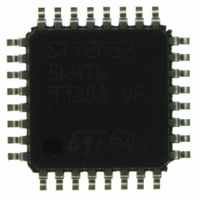ST72F325K4T6 STMicroelectronics, ST72F325K4T6 Datasheet - Page 119

ST72F325K4T6
Manufacturer Part Number
ST72F325K4T6
Description
MCU 8BIT 16KB FLASH/ROM 32-LQFP
Manufacturer
STMicroelectronics
Series
ST7r
Datasheet
1.ST72F325K6T6.pdf
(197 pages)
Specifications of ST72F325K4T6
Core Processor
ST7
Core Size
8-Bit
Speed
8MHz
Connectivity
I²C, SCI, SPI
Peripherals
LVD, POR, PWM, WDT
Number Of I /o
24
Program Memory Size
16KB (16K x 8)
Program Memory Type
FLASH
Ram Size
512 x 8
Voltage - Supply (vcc/vdd)
3.8 V ~ 5.5 V
Data Converters
A/D 16x10b
Oscillator Type
Internal
Operating Temperature
-40°C ~ 85°C
Package / Case
32-LQFP
Processor Series
ST72F3x
Core
ST7
Data Bus Width
8 bit
Data Ram Size
512 B
Interface Type
I2C, SCI, SPI
Maximum Clock Frequency
8 MHz
Number Of Programmable I/os
48
Number Of Timers
2
Maximum Operating Temperature
+ 85 C
Mounting Style
SMD/SMT
Development Tools By Supplier
ST7232X-EVAL, ST7232X-SK/RAIS, ST72325-D/RAIS, ST7MDT20-DVP3, ST7MDT20J-EMU3, ST7MDT20M-EMU3, STX-RLINK
Minimum Operating Temperature
- 40 C
On-chip Adc
10 bit, 16 Channel
For Use With
497-5046 - KIT TOOL FOR ST7/UPSD/STR7 MCU
Lead Free Status / RoHS Status
Lead free / RoHS Compliant
Eeprom Size
-
Lead Free Status / Rohs Status
Details
Other names
497-5605
Available stocks
Company
Part Number
Manufacturer
Quantity
Price
Company:
Part Number:
ST72F325K4T6
Manufacturer:
ST
Quantity:
151
Company:
Part Number:
ST72F325K4T6
Manufacturer:
STMicroelectronics
Quantity:
10 000
Part Number:
ST72F325K4T6
Manufacturer:
ST
Quantity:
20 000
Company:
Part Number:
ST72F325K4T6TR
Manufacturer:
STMicroelectronics
Quantity:
10 000
10.7 I
10.7.1 Introduction
The I
tween the microcontroller and the serial I
provides both multimaster and slave functions,
and controls all I
tocol, arbitration and timing. It supports fast I
mode (400kHz).
10.7.2 Main Features
■
■
■
■
■
■
■
I
■
■
■
■
■
■
■
I
■
■
■
■
■
■
■
10.7.3 General Description
In addition to receiving and transmitting data, this
interface converts it from serial to parallel format
Figure 67. I
2
2
C Master Features:
C Slave Features:
Parallel-bus/I
Multi-master capability
7-bit/10-bit Addressing
SMBus V1.1 Compliant
Transmitter/Receiver flag
End-of-byte transmission flag
Transfer problem detection
Clock generation
I
Arbitration Lost Flag
End of byte transmission flag
Transmitter/Receiver Flag
Start bit detection flag
Start and Stop generation
Stop bit detection
I
Detection of misplaced start or stop condition
Programmable I
Transfer problem detection
End-of-byte transmission flag
Transmitter/Receiver flag
2
2
C bus busy flag
C bus busy flag
2
2
C Bus Interface serves as an interface be-
C BUS INTERFACE (I2C)
2
SCL
SDA
C BUS Protocol
2
C protocol converter
CONDITION
2
C bus-specific sequencing, pro-
2
START
C Address detection
MSB
1
2
C bus. It
2
2
C
and vice versa, using either an interrupt or polled
handshake. The interrupts are enabled or disabled
by software. The interface is connected to the I
bus by a data pin (SDAI) and by a clock pin (SCLI).
It can be connected both with a standard I
and a Fast I
ware.
Mode Selection
The interface can operate in the four following
modes:
– Slave transmitter/receiver
– Master transmitter/receiver
By default, it operates in slave mode.
The interface automatically switches from slave to
master after it generates a START condition and
from master to slave in case of arbitration loss or a
STOP generation, allowing then Multi-Master ca-
pability.
Communication Flow
In Master mode, it initiates a data transfer and
generates the clock signal. A serial data transfer
always begins with a start condition and ends with
a stop condition. Both start and stop conditions are
generated in master mode by software.
In Slave mode, the interface is capable of recog-
nising its own address (7 or 10-bit), and the Gen-
eral Call address. The General Call address de-
tection may be enabled or disabled by software.
Data and addresses are transferred as 8-bit bytes,
MSB first. The first byte(s) following the start con-
dition contain the address (one in 7-bit mode, two
in 10-bit mode). The address is always transmitted
in Master mode.
A 9th clock pulse follows the 8 clock cycles of a
byte transfer, during which the receiver must send
an acknowledge bit to the transmitter. Refer to
ure
67.
8
2
C bus. This selection is made by soft-
ACK
9
CONDITION
STOP
ST72325xx
VR02119B
119/197
2
C bus
Fig-
2
C













